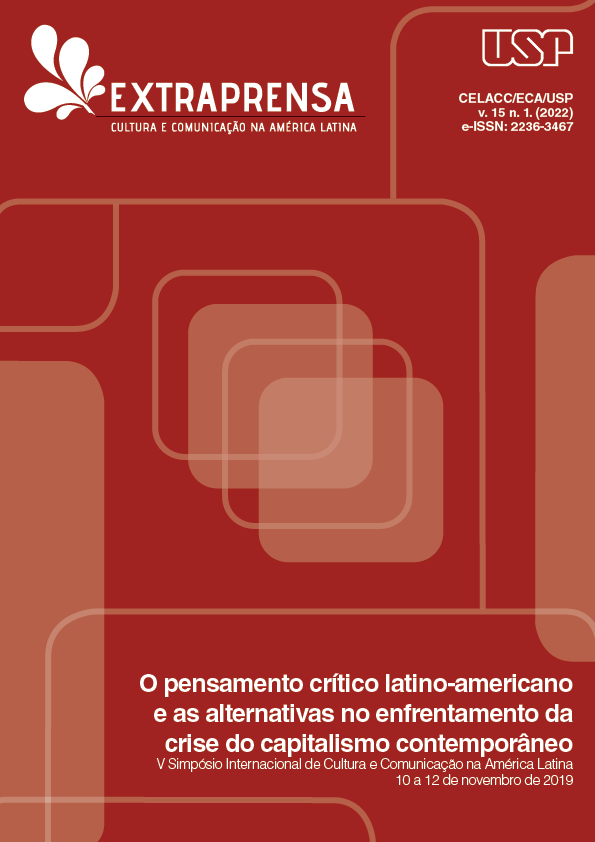Racism in the 2019 coup d'etat in Bolivia: records between October 20th and November 14th
DOI:
https://doi.org/10.11606/extraprensa2022.194093Keywords:
Bolívia, coup, racism, Carlos Mesa, Evo MoralesAbstract
This article intends to analyse the processes that took place in Bolivia between October 20th and November 14th, 2019, during the presidential elections and the days that followed it, culminating in the coup d'etat that forced the president and vice-president elect, Evo Morales and Álvaro Garcia Linera, to flee the country under threats. In order to do that, this article will use interviews conducted during this period by the author and official data, related to the concepts of social, racial and patriarchal contract first proposed by Charles W. Mills (1997). In his work, Mills analyzes the Latin-American colonization process in its racist and sexist dynamics, and the impacts of this process felt today on peripheral countries. An important hallmark of this period was the burning of the Wiphala flag, which carries symbolism of the native peoples of the Andean Mountains region.
Downloads
References
CAMARGO, Alfredo José Cavalcanti Jordão de. Bolívia: a criação de um novo país; a ascensão do poder político autóctone das civilizações pré-colombianas a Evo Morales. Brasília: Ministério das Relações Exteriores, 2006.
CANCLINI, Néstor García. A globalização imaginada. São Paulo: Iluminuras, 2007.
CANCLINI, Néstor García. Culturas híbridas - estratégias para entrar e sair da modernidade. Tradução de Ana Regina Lessa e Heloísa Pezza Cintrão. São Paulo: EDUSP, 2019.
ESTADO PLURINACIONAL DE BOLIVIA. Decreto Supremo, Nº 0048, del 18 Marzo 2009, Bolívia. Disponível em: https://www.derechoteca.com/gacetabolivia/decreto-supremo-0048-del-18-marzo-2009. Acesso em: 24 set. 2021.
MACEDO, Guilherme Fenício Alves; MEDEIROS, Enzo Gabriel Oliveira. A (Sub)Condição Whipala: uma análise decolonial sobre a violência estrutural e cultural contra os povos originários na Bolívia pós-ruptura democrática (2019). Revista Perspectiva, [S. l.], ano 2020, v. 13, n. 25, p. 71-98.
MILLS, Charles Wade. The racial contract. [S. l.]: Cornell University Press, 1997.
RODRIGUES, Martha Raquel. Antes do golpe, boliviana celebrava os avanços do governo de Evo Morales. Jornalistas Livres, [S. l.], 10 nov. 2019. Disponível em: https://jornalistaslivres.org/antes-do-Golpe-boliviana-celebrava-os-avancos-do-governo-de-evo-morales/. Acesso em: 2 out. 2021.
SANTOS, Milton. Por uma outra globalização: do pensamento único à consciência universal. 10. ed. Rio de Janeiro: Record, 2003.
SANTOS, Milton. A natureza do espaço. São Paulo: Edusp, 2004.
PERIÓDICO DIGITAL DE INVESTIGACIÓN SOBRE BOLÍVIA (PIEB). Historiador: la inclusión de la wiphala como símbolo patrio tiene un sentido estratégico. Periódico Digital PIEB, [S. l.], 20 jan. 2010. Disponível em: http://www.pieb.com.bo/nota.php?idn=4608. Acesso em: 23 set. 2021.
QUIJANO, Anibal. A colonialidade do saber: eurocentrismo e ciências sociais, perspectivas latino-americanas. Buenos Aires: CLACSO, 2005. p. 117-142.
Downloads
Published
Issue
Section
License
Copyright (c) 2022 Martha Raquel Rodrigues

This work is licensed under a Creative Commons Attribution-NonCommercial-NoDerivatives 4.0 International License.
Ao submeter qualquer material científico para Extraprensa, o autor, doravante criador, aceita licenciar seu trabalho dentro das atribuições do Creative Commons, na qual seu trabalho pode ser acessado e citado por outro autor em um eventual trabalho, porém obriga a manutenção de todos os autores que compõem a obra integral, inclusive aqueles que serviram de base para o primeiro.
Toda obra aqui publicada encontra-se titulada sob as seguintes categorias da Licença Creative Commons (by/nc/nd):
- Atribuição (de todos os autores que compõem a obra);
- Uso não comercial em quaisquer hipóteses;
- Proibição de obras derivadas (o trabalho não poderá ser reescrito por terceiros. Apenas textos originais são considerados);
- Distribuição, exibição e cópia ilimitada por qualquer meio, desde que nenhum custo financeiro seja repassado.
Em nenhuma ocasião a licença de Extraprensa poderá ser revertida para outro padrão, exceto uma nova atualização do sistema Creative Commons (a partir da versão 3.0). Em caso de não concordar com esta política de Direito Autoral, o autor não poderá publicar neste espaço o seu trabalho, sob pena de o mesmo ser removido do conteúdo de Extraprensa.







